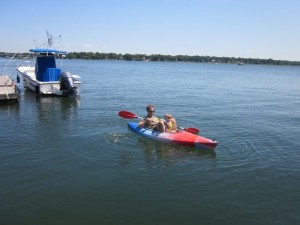The other day I had the fantastic fun of working with two math
teachers and their Algebra and Geometry classes to kick-off their year-long
personalized learning textbook project. These two brilliant teachers have
crafted an innovative way to both present information in their math classes and
have students create meaningful products that show what they’ve learned.
First I’ll focus on the presentation tool. I can take zero
credit for finding this tool or realizing its potential. That all came from Mr.
and Mrs. Math. In fact, the first time Mrs. Math showed me Nearpod, I didn’t
really get it. But now I do!
 Nearpod lets you create a presentation on your teacher
laptop that is highly visual and interactive, both features we’ve come to
expect from 21st century presentation software and apps. But Nearpod
takes it to the next level by giving you the ability to send your presentation
out to a classroom full of iPads. As you swipe your screen, students’ screens
change too. No more squinting at the SMART board, no more craning your neck
around the tall kid in the front row, no more turning off all the lights so
kids can see the screen. With Nearpod, the presentation is right in front of
them, on the iPad screen.
Nearpod lets you create a presentation on your teacher
laptop that is highly visual and interactive, both features we’ve come to
expect from 21st century presentation software and apps. But Nearpod
takes it to the next level by giving you the ability to send your presentation
out to a classroom full of iPads. As you swipe your screen, students’ screens
change too. No more squinting at the SMART board, no more craning your neck
around the tall kid in the front row, no more turning off all the lights so
kids can see the screen. With Nearpod, the presentation is right in front of
them, on the iPad screen.
Even better than each student having the presentation
showing right in front of them, is the interactive capability of Nearpod. Today
when I presented, I put an interactive slide after each content slide I made.
In other words, first I talked about using technology appropriately in school,
then I asked a polling question where the students decided whether or not a behavior
was appropriate or not. I loved being
able to do this all in one device and app! And, once each student had entered a
response, I could share the results out to the students. Immediately they could
see how their answer compared to the class much like the “clickers” many other
classrooms are using.
(Quick math aside: students immediately asked and questioned
the use of percentages to display the results – we had a quick, relevant,
engaging math lesson on percentages, yea!)
Nearpod also has interactive tools like open-ended text
questions, allowing you to ask deeper and more probing questions. As students
answer these, you can see each response next to each student’s name. And, if
there is a particularly poignant response, you can share that response
(anonymously) out to the class. What a quick and easy way for students to see
models of the kinds of responses they could craft.
Math teachers will particularly like the ability for
students to draw as an assessment. Teachers can upload an image, say, of a
graph, and each student can draw over that graph, say, calculating slope. As
they submit you see a tiny screen shot next to each student’s name. And, again,
you have the ability to choose one of those drawings and share it out to the
class. Because it is anonymous when you share, you can easily share common
mistakes as well as exemplars. Students really liked this feature. They liked
being able to draw their answer (and personalize it with color, etc.) and they
liked seeing what their peers did. Let’s face it, in a middle school class,
they are so much more interested in what their peers are doing than in what the
teacher does!
I think the best part of Nearpod was when students said this
after the lesson:
“Can we do that again?”
In terms of explicit instruction and the I do, We do, You
do, model, Nearpod rocks the house. I’m really excited about exploring its
possibilities for the times when you need to do whole group instruction because
it feels so much more collaborative, interactive and personalized that even the
most amazingly fantastic Prezi.
More coming on what we did next, and how these students are
going to build their own interactive textbooks!
























